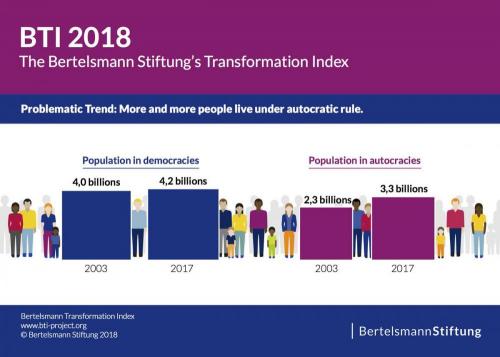
https://www.bertelsmann-stiftung.de/en/press/press-releases/press-releas...
Restrictions on free speech, unfair elections and populist hunger for power – it is by no means just autocrats who have been tightening the screw of repression. Governments in democracies have also increasingly been trying to govern with a hard hand. And social division is deeper than it has been for a long time. The current Transformation Index of the Bertelsmann Stiftung shows what is behind this development, and which countries have been particularly affected.
Gütersloh (Germany) 22 March 2018. The quality of democracy, market economy and governance has fallen to its lowest level in twelve years on a worldwide average. This is the key finding of the latest Transformation Index of the Bertelsmann Stiftung (BTI). Since 2006, it has regularly analyzed political and economic developments in 129 developing and transformation countries. Conclusion: 40 governments, including some of more advanced democracies, have curtailed the rule of law over the past two years, and 50 countries have seen restrictions on political freedoms. The rulers of many countries have addressed the global economic challenges only insufficiently and frequently on the backs of the poor and marginalized. Many governments are unable to respond adequately to the growing social, ethnic and religious conflicts – or oftentimes even foment these tensions.
From the point of view of Bertelsmann Stiftung, a major reason for the poor results is that many governments are not capable or inclined to react to social conflicts by engaging in dialog and seeking a consensus. Governments’ willingness to defuse conflicts has decreased in 58 countries since 2006, according to the index. Once elected, many rulers curtail political liberties and rights in order to expand their political power. This is particularly the case with authoritarian populists like those in Hungary or Turkey, even though they have come to power via grassroots movements and polarization themselves. "Many rulers try to cement their claim to leadership through repressive measures. However, in the long run, ruling by coercion and not by dialog always leads to a dead end," says Aart De Geus, Chairman of the Bertelsmann Stiftung, commenting on the research findings.
More inequality, less freedom
The authors view unsatisfactory socio-economic development to be one of the greatest impediments to development towards democracy and economic sustainability. According to the study, there is massive poverty and a high level of social inequality in 72 developing and transformation countries. In 22 of them, including India, South Africa and Venezuela, there has even been a decline in the level of socio-economic development in the last ten years. During the same time period, the proportion of countries achieving a moderate to good level of social inclusion sank from a third to a quarter.
More and more people are living not only in less equal, but also in more repressive environments. At the present time, 3.3 billion people are governed autocratically (4.2 billion democratically), which is the highest number since the study began. Of the 129 countries studied, the BTI classifies 58 as autocracies (2016: 55) and 71 as democracies (2016: 74). But it is not so much the slight increase in the number of autocracies that is worrying. More problematic is the fact that civil rights are being curtailed and the rule of law undermined in an increasing number of democracies as well. Former beacons of democratization such as Brazil, Poland and Turkey are among the countries that have fallen the most in the Transformation Index.
Only Burkina Faso and Sri Lanka were making significant progress towards democracy during the period under review. By contrast, there are a total of 13 countries, including Mozambique, Turkey and Yemen, where the political situation has become significantly worse. Five of these 13 countries no longer meet minimum standards for democracy: countries such as Bangladesh, Lebanon, Mozambique, Nicaragua and Uganda, where democracy has been gradually undermined for years, are under autocratic rule. It was often shortcomings in the quality of elections that tipped the balance.
Democracies govern better than autocracies
These developments are worrying for citizens because corruption, social exclusion and barriers to fair economic competition continue to be more prevalent in autocracies. According to the BTI, while 12 democracies have combated corruption successfully, only one autocracy did so. Only two autocracies, but eleven democracies have achieved sufficient equal opportunity. 27 democracies, but only two autocracies exhibit well-functioning market and competitive systems. "The BTI clearly shows that antidemocratic systems are by no means more stable and efficient than democratic ones," says Aart De Geus.
It is true that China, whose share of the global economy has increased the most in the last ten years, is considered by many to be a prime example of prosperity in a state of absence of freedom. However, those who attribute China's economic success solely to its political system fail to recognize the predominantly poor economic results of autocracies as a whole – and the dangers of a cult of personality. This can be seen clearly by looking at other autocratic systems such as Russia, Thailand and Venezuela. Here, according to the experts of the Transformation Index, both economic as well as democratic development have been stagnating for years.
Additional Information
Since 2006, the Transformation Index of the Bertelsmann Stiftung (BTI) has analyzed and monitored the quality of democracy, the market economy and governance in 129
developing and transformation countries on a regular basis. The assessments are based on detailed country reports authored by 250 experts from leading international universities and think tanks. The current assessment period is from February 1, 2015, to January 31, 2017. The BTI is the only crossnational index that measures governance quality through self-collected data and provides an analysis of political management in transformation processes.










Add new comment